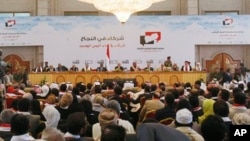On March 18, 2011, a group of government soldiers, hiding behind a wall on Sana’a’s Change Square, began shooting at unarmed protesters who had taken a break from voicing their demands for the resignation of Yemen’s long-time President, Ali Abdullah Saleh, and began gathering for noonday prayers. The protesters charged and toppled the wall, and in the process, started the revolution that would eventually unseat Saleh. Fifty-three protesters died, but the events of that day, known as Jumaa al-Karama, or the Friday of Dignity, unified Saleh’s opposition, and caused mass defections of officials from Saleh’s government and army.
Saleh agreed to step down later that year, and his successor, President Abd Rabbuh Mansur Hadi has led the country’s political transition. On January 25, the Yemeni people concluded a National Dialogue Conference -- the most inclusive discussion of its kind on the structure of the state, its political system, Yemen’s constitution, and other issues key to Yemen’s transition.
To welcome the conclusion of Yemen’s historic National Dialogue, the United Nations Security Council adopted in late February Resolution 2140, reaffirming the Council’s support for the implementation of subsequent stages in the country’s political transition process.
The United States fully supports UNSC Resolution 2140. “On Yemen, this Security Council has been able to consistently speak with a strong, clear voice. Together, we have welcomed efforts by President Hadi and the people of Yemen to implement meaningful reform, and we stand firmly committed to supporting Yemen throughout the transition process,” said U.S. Ambassador to the United Nations, Samantha Power.
“This resolution underscores the importance of turning the page on Saleh’s presidency to meet the aspirations of the Yemeni people, including guarantees for the representation of women in government.
“The Council has made clear that we remain firmly committed to supporting Yemen as it implements subsequent steps in the transition process, including constitutional reform and national elections. With today’s resolution, the Council has taken the forward-leaning step of setting up a committee that is prepared to sanction individuals for impeding the ongoing transition in Yemen. With the establishment of this mechanism, the Council is better equipped to respond in a timely manner to those who seek to derail progress for the Yemeni people.”
Saleh agreed to step down later that year, and his successor, President Abd Rabbuh Mansur Hadi has led the country’s political transition. On January 25, the Yemeni people concluded a National Dialogue Conference -- the most inclusive discussion of its kind on the structure of the state, its political system, Yemen’s constitution, and other issues key to Yemen’s transition.
To welcome the conclusion of Yemen’s historic National Dialogue, the United Nations Security Council adopted in late February Resolution 2140, reaffirming the Council’s support for the implementation of subsequent stages in the country’s political transition process.
The United States fully supports UNSC Resolution 2140. “On Yemen, this Security Council has been able to consistently speak with a strong, clear voice. Together, we have welcomed efforts by President Hadi and the people of Yemen to implement meaningful reform, and we stand firmly committed to supporting Yemen throughout the transition process,” said U.S. Ambassador to the United Nations, Samantha Power.
“This resolution underscores the importance of turning the page on Saleh’s presidency to meet the aspirations of the Yemeni people, including guarantees for the representation of women in government.
“The Council has made clear that we remain firmly committed to supporting Yemen as it implements subsequent steps in the transition process, including constitutional reform and national elections. With today’s resolution, the Council has taken the forward-leaning step of setting up a committee that is prepared to sanction individuals for impeding the ongoing transition in Yemen. With the establishment of this mechanism, the Council is better equipped to respond in a timely manner to those who seek to derail progress for the Yemeni people.”






